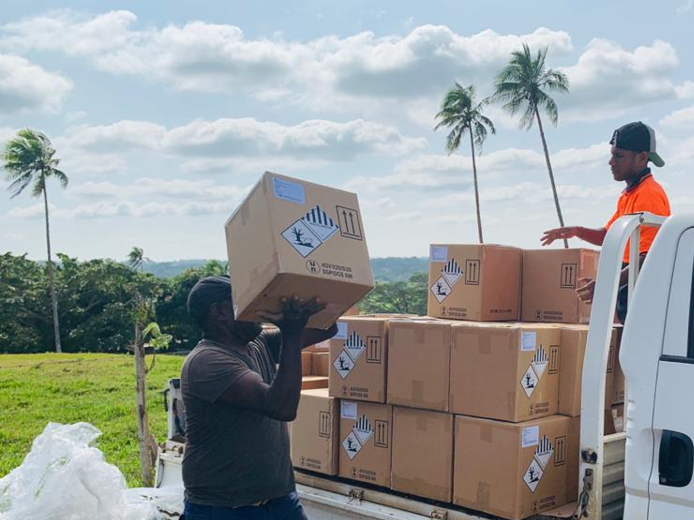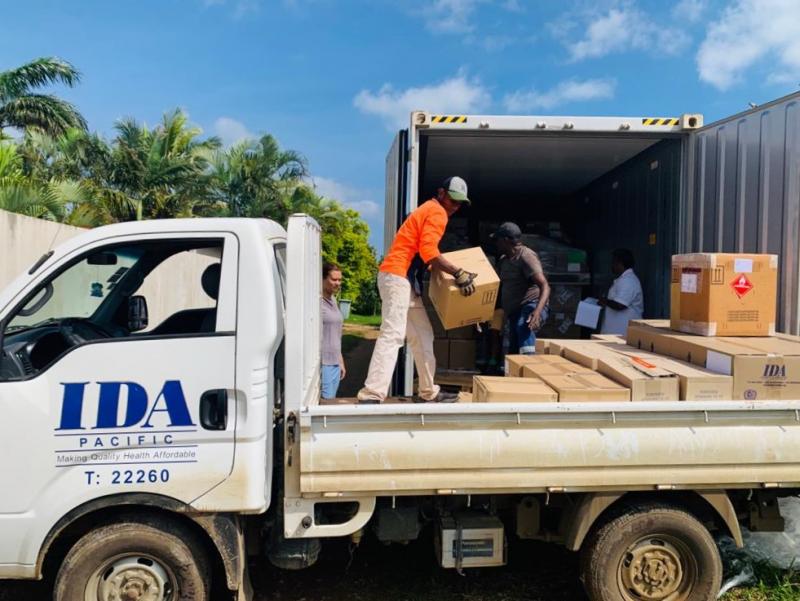Ensuring access to essential health products in the Pacific region
Blog
Amsterdam, 14 January 2022 – IDA Pacific, IDA's local distributor in Vanuatu, has been a partner of IDA Foundation for roughly fifteen years now, and by keeping their own stock of IDA products, they ensure that the people living in the Pacific region have access to quality medical supplies and essential medicines. We asked them to share their experiences for the occasion of our 50th anniversary and the accompanying stories campaign. Located in remote Vanuatu, their experiences are very different from other regions due to this location. Meet Ricardo Bow (R) and Michelle Breinburg (M) of IDA Pacific.
Q: You have been an agent/distributor of IDA Foundation for almost fifteen years! How did this partnership start?
M: As a young trainee I joined the IDA team briefly for an internship within Accounts Receivable. That’s how I learned about IDA Foundation and their work in low- and middle-income countries (LMICs). When Ricardo and I travelled around the world, we noticed the lack of access to health care and the need for quality medicines especially in LMICs. When we emigrated to Vanuatu, I reached out to IDA, a few sales members came to visit us and also traveled around within the Pacific region. This is when we first became an IDA agent, later we took the role as local distributor based in Vanuatu.
Q: Can you share a little more about IDA Pacific and about the region that you serve?
R: The Pacific region is quite unique, this has to do with its geographic location, but also with the mentality of the people that live here. Vanuatu consists of eighty different islands, of which 65 are inhabited. As the distance between the separate islands is substantial, each island has developed their own languages, traditions and mentality, only in the larger cities there is an obvious western influence.
M: The people’s mentality here is mostly reserved, pleasant and modest. The majority of the people here will always smile, reflecting their positive attitude and they will avoid conflict and confrontation. Intuition and trust play an important role, especially in the remote communities within the region.
Q: When it comes to health care, what are the biggest health issues this population faces, and what are the most important health needs or products?
R: The most important thing is the lack of specialisation and equipment in the healthcare sector. Due to a lack of funds, there’s only basic health care. There is only little professionalism and a lack of specialists and proper facilities. People die from diseases and conditions that could be easily treated, but there is not enough expertise and there are not enough facilities in the region.
M: For many treatments you need to travel to one of the larger islands, to Fiji or even to New Zealand or Australia. There are private doctors on some islands but they are expensive, it’s quite normal here for family members to take care of the ill. Another issue is that the people here also look for tribal solutions and alternative medication by custom healers caused by tradition and superstition.
Q: Do you notice the impact of COVID-19 on the healthcare system?
M: As the country has been closed off, Vanuatu has not had any cases of corona yet, so there is not a direct impact on the health system. But now it’s really hard or maybe even impossible to travel out of Vanuatu to seek medical attention. We expect the borders to be opened again later this year.
Q: What do you consider the largest supply chain challenges for you operating in this area?
R: Effectively, "island time" or so-called procrastination and the infrastructure can be quite challenging. We are currently waiting for three containers, they have arrived in Vanuatu but until now we are waiting for them to be delivered to us.
M: It is important to be patient and positive, we are dependent on the system so we try to adapt to that and stay friendly at all times.
R: Another challenge during these times, related to the corona crisis, are extremely high freight costs. With help from IDA Foundation we hope to be able to plan as efficient as possible as they have the expertise when it comes to planning and forecasting.

Q: What are some of the personal achievements you are proud of in these past years?
R: We are quite well-known in the region. We want to keep building the relationships with our customers and we aim to keep growing our stock. We just built a warehouse, which is good for proper stock management. It is a blessing to work closely together with IDA, and their dedicated teams.
Q: IDA Foundation has redefined its strategy with three long-term goals, being achievement of universal health coverage (UHC), strengthened local capacity and building sustainable value chains. When we look at strengthening local (health and supply chain) capacity, we believe that agents and distributors, like yourself, play an important role in global health development. How do you think that your role as a distributor can best be leveraged to strengthen local health capacity?
R: To us it is also important to be a part of this! We have the knowledge about the region and its environment, about the people that live here and their mentality and cultures. We do however, need IDA’s expertise when it comes to the products that we have in stock and the quality of these products, but we also need to know when is the right time to stock certain products as this is dependent on the developments in the pharmaceutical industry.
M: Yes indeed, we have a lot of knowledge about the country and the Pacific region and IDA Foundation has the expertise and knowledge on pharmaceuticals and medical supplies. We need each other in order to strengthen the position of IDA in this region and its local capacity.
Q: Another long-term goal is achieving UHC, making sure that all people globally have access to medicines and medical supplies. What are the most important steps to achieving this in your opinion?
R: I think for IDA Foundation it’s important to be seen and well-known, as this will lead to more shipments and thus to more products in places where they are needed most. For us this means that if we want to be more represented as an IDA distributor, we need larger volumes so we can supply more IDA products to people in this region. When we are sharper than competitors and the IDA brand is well-known our reach will get larger, increasing access to health products.
Q: There is increasing focus on the need for sustainable value chains, taking into account human rights and environmental issues for example. Where do you see the biggest opportunities and challenges in Vanuatu?
M: There are some policies considering the environment, as there is now a ban on the import and use of single-use plastics and as an island nation, there are policies related to protecting marine species. But at the same time there are hardly any policies on waste management, and the regulations that are in force are barely monitored.
R: We believe that creating awareness around waste by sharing information through courses or trainings, can make a difference even if it’s just small. It would also help if available money and subsidies would go directly to the population. We cannot save the planet on our own, but we can make a difference close to our own homes.
Q: For our 50th anniversary, we are looking at what we have achieved, but we are also focusing on what we want to achieve in the future. We hope that our work with you and other partners contributes to ‘building healthy futures’. What are your goals and wishes for global health and for our partnership in the next decades?
R: Our main goal is to make sure that healthcare becomes available and affordable. We are working on a good reputation as a provider of health products. We are building strong relationships with the people here and with our customers and show them that we are here to help them. When we build on that trust, we believe the rest will follow!
M: We highly value ethics and we want the people in this region to benefit from our work.
R: When it comes to our partnership we hope that it will keep developing as it has done the last couple of years. With increased communication and appreciation we can come a long way. We look forward to constantly improving our relationship together and that we keep challenging each other to become more productive and efficient!
Thanks to Michelle and Ricardo for sharing these local insights!
Stay tuned for more 50 years stories from our global network...

